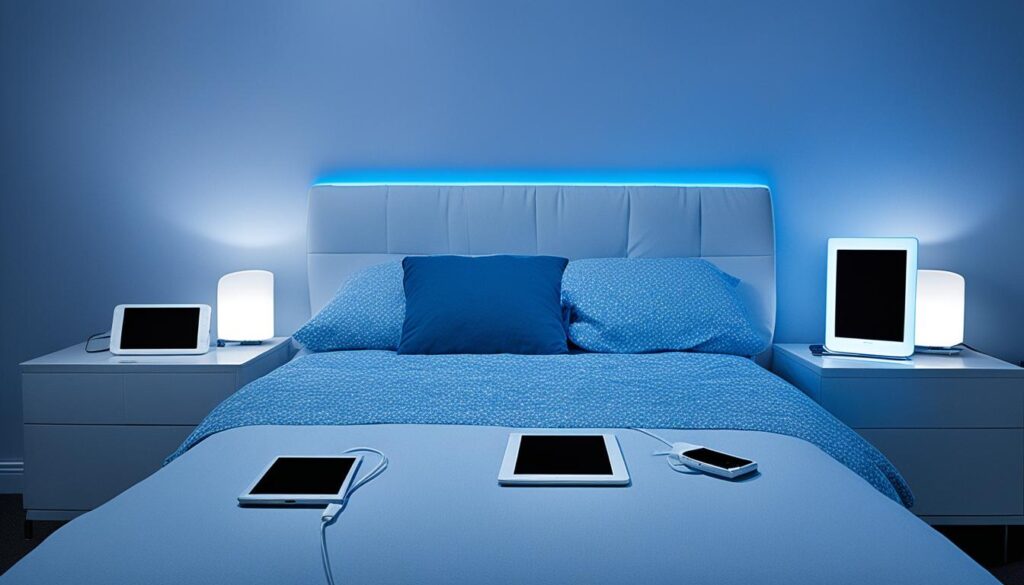Sleep is key for feeling good and staying healthy. If you’re not sleeping well, we have tips to help. This article will look at ways to boost your sleep.
Key Takeaways:
- Develop and stick to a consistent sleep schedule to regulate your body’s internal clock.
- Pay attention to your diet and hydration, avoiding heavy meals close to bedtime.
- Create a restful environment in your bedroom by keeping it cool, dark, and quiet.
- Limit daytime napping to avoid disruptions in nighttime sleep.
- Incorporate regular physical activity into your daily routine for better sleep.
Stick to a Sleep Schedule
Having a set sleep schedule helps you sleep better and keeps your body in sync. It works by building good habits and boosts your health.
Shoot for 7-8 hours of sleep each night to feel rested. Try going to bed and getting up at the same time, daily. Even on the weekends. Your body will learn this routine, and you’ll sleep and wake naturally.
If sleep doesn’t come within 20 minutes, avoid getting upset. Instead of staring at the ceiling, choose a calming activity. You could read, do deep breaths, or listen to quiet music. This will relax your mind and body for sleep.
Remember, keeping at it with your sleep routine is vital. Doing so over time will boost how well you sleep. This means waking up ready to tackle the day ahead.
Benefits of a Sleep Schedule:
- Regulates your body’s internal clock
- Improves sleep quality
- Enhances overall well-being
- Reduces the time it takes to fall asleep
- Increases feelings of relaxation and calmness
Common Sleep Schedule Mistakes:
- Inconsistent bedtimes and wake-up times
- Excessive napping during the day
- Ignoring your body’s natural sleep cues
- Engaging in stimulating activities before bed
Making sleep a priority can really improve how you feel and how well you sleep. Setting a regular bedtime leads to a night full of rest. And that means you wake up ready for a new day.
Pay Attention to Your Diet and Hydration
What you eat and drink can really affect how well you sleep. A diet that’s balanced and staying hydrated help you sleep better.
Eat light meals before bed to avoid feeling too full. Big meals can keep you up. Also, avoid caffeine and nicotine. They make it tough to sleep.
But, going to bed hungry isn’t great either. If you’re hungry, a snack with protein and carbs is good. It helps steady your blood sugar and promotes sleep.
Keeping hydrated is important for sleep too. Not enough water can make you uncomfortable at night. But, try not to drink a lot close to bedtime to dodge bathroom trips.
Examples of Foods That Promote Better Sleep:
| Food | Benefits for Sleep |
|---|---|
| Fruits and Vegetables | Provide essential nutrients and fiber that support a healthy sleep-wake cycle. |
| Whole Grains | Contain complex carbohydrates that promote the production of serotonin, a neurotransmitter that aids in sleep regulation. |
| Lean Proteins | Help regulate blood sugar levels and provide amino acids necessary for the production of sleep-related hormones. |
| Nuts and Seeds | Rich in magnesium, which can help regulate melatonin production and improve sleep quality. |
We all have different diets and needs. So, watch how the food and drink you have affect your sleep. Use a food diary to spot what helps or harms your sleep.

Create a Restful Environment
Your sleep area greatly affects how well you rest. Here are tips for a better sleep zone:
- Keep your room cool: Cooler temps aid sleep. Aim for 60-67°F. (15-19°C).
- Darken your room: Light can disturb your sleep. Use dark shades so it’s night-like in your room.
- Ensure a quiet space: Noise can keep you up at night. Try earplugs or white noise to cancel out disruptions.
Doing calming things before bed can make a big difference in sleep quality. Here are some ideas:
- Take a bath: A warm bath can calm and prep you for sleep.
- Practice relaxation techniques: Try deep breathing or meditation to relax your mind.
Making your bedroom better for sleep can really help. Control the temperature, darkness, and reduce noise. Also, add calming routines to your evening for the best rest.
A restful sleep environment is key to good sleep. The image shows a peaceful bedroom, ideal for a deep, quiet sleep.
| Tip | Benefits |
|---|---|
| Keep your room cool | – Promotes deeper sleep – Reduces the risk of night sweats – Enhances comfort |
| Darken your room | – Blocks out disruptive light sources – Helps regulate your body’s natural sleep-wake cycle |
| Ensure a quiet space | – Minimizes disturbances that can interrupt sleep – Enhances overall sleep quality |
| Take a bath | – Calms the mind and relaxes the body – Signals the transition to sleep |
| Practice relaxation techniques | – Reduces stress and anxiety – Promotes a sense of calm and tranquility |
Limit Daytime Napping
Short naps can help, but too long can ruin your night’s rest. They might make you sleep less at night. To get the best sleep, keep naps under control.
- Don’t nap for more than an hour.
- Avoid napping too close to bedtime.
- If you’re a night worker, be careful when you nap so it doesn’t harm your sleep later on.
Following these tips ensures you enjoy good day rests and better night sleeps. The aim is to improve how well and long you sleep. This way, you’ll greet mornings with a fresh and ready mind.

| Nap Duration | Nap Timing | Effect on Nighttime Sleep |
|---|---|---|
| Short power nap (20-30 minutes) | Mid-afternoon | Refreshes and boosts alertness without interfering with nighttime sleep |
| Extended nap (over 60 minutes) | Anytime during the day | May cause difficulty in falling asleep and disrupt nighttime sleep |
| Napping late in the day | Close to bedtime | May interfere with the ability to fall asleep at night |
Incorporate Physical Activity
Regular exercise is great for both your body and sleep. It helps set your body’s rhythm for better rest.
However, the type and timing of your workout matter. Avoid late, high-energy exercises, as these might keep you awake. Opt for mid-level activities earlier in the day.
Spending time under the sun can greatly aid your sleep. Sunlight syncs your body’s clock, making it easier to sleep well. So, try to get outside for walks, runs, or bike rides as often as you can.
Everyone has different exercise tastes. Pick what you love and can do regularly. It could be something like dancing, swimming, or team sports. Just move your body in a way that you find fun and it will help you sleep better.
Benefits of Physical Activity for Sleep
Every workout contributes to a good night’s sleep in these ways:
- Improved sleep duration
- Enhanced sleep quality
- Reduced insomnia symptoms
- Regulated sleep-wake cycles
With enough exercise, you’ll find it easier to get the 7-8 hours of rest recommended. This leads to better sleep length.
Exercising releases endorphins, the happy hormones. They reduce stress and make you feel calm, which betters your sleep quality.
Active people often suffer less from insomnia. This means they can fall asleep and stay asleep more easily.
Moving your body daily regulates your sleep cycle. This makes it simpler to both fall asleep and wake up when you need to.
Making exercise part of your daily life is key for sleep improvements. But always being mindful of your health is crucial too. If you have health issues, remember to consult a doctor. Find what exercise level makes you feel balanced and sleep like a baby.
Manage Stress and Worries
Stress and worries affect how well we sleep. If you’re thinking about problems at night, it’s hard to calm down and sleep. So, it’s really important to find ways to lower stress for better sleep. Here are some tips to help with that:
- Get organized: Make a list of your tasks and rank them. When you see big tasks broken into smaller steps, it’s easier. This reduces stress and helps you get things done.
- Set priorities: Know what you must do and focus on that first. Setting priorities helps avoid stress from not being able to finish everything.
- Delegate tasks: It’s okay to let others help or do some tasks for you. This can reduce your stress and stop you from feeling too much pressure.
Adding relaxation to your bedtime can calm your thoughts, helping you sleep better. Try these relaxing activities:
- Meditation: Focus on the now with mindfulness meditation. It lets you ditch the busy thoughts and start to relax slowly.
- Deep breathing exercises: Breathing deeply can make your body’s calm process start. Breathe in slowly, then out fully, to let go of stress and feel more tranquil.
With stress management and these calming practices, you can improve your sleep. A quiet mind is vital for a good night’s rest.

| Technique | How It Helps |
|---|---|
| Meditation | Reduces stress and promotes relaxation |
| Deep breathing exercises | Activates the body’s relaxation response and helps calm the mind |
Optimize Your Bedroom Setup
Your bedroom setup is key to a great night’s sleep. It’s important to choose the right items for comfort. Also, setting the right ambiance helps you relax. Here’s how to make your bedroom perfect for sleeping:
- Invest in a Comfortable Mattress, Pillows, and Bedding: Pick a mattress that fits your sleeping style and supports your body well. Try different pillows to see what’s most comfy for you. Also, choose bedding made of quality, breathable materials.
- Use Blackout Curtains or a Sleep Mask: Too much light can mess with your sleep by reducing melatonin. Use blackout curtains or a sleep mask to make your room dark and aid in sleeping better.
- Minimize Noise Disruptions: Loud noises can keep you from deep sleep. Earplugs or white noise machines can help by blocking or covering up these sounds.
- Keep the Temperature Cool: Most people sleep better in cooler temperatures. Adjust your thermostat or use a fan to keep your room cool.
- Create a Clutter-Free Space: A tidy room helps you feel more relaxed. Keep your bedroom neat and organized to encourage a sense of peace and quiet.
These strategies are a great start to improve your sleep space. Feel free to try different things to see what relaxes you most. Better sleep awaits when you make your bedroom an inviting, peaceful space.
Limit Exposure to Electronics
Electronic devices are a big part of daily life now. We use them for talking, fun, and learning. But, using them before sleep isn’t good. The blue light they give off can mess with our sleep and lower melatonin, a sleep hormone.
To get better sleep, cutting back on electronics is key. They make it hard to relax and sleep well. Here are some ways to use less electronics before bed:
- Establish a “No Electronics” Rule: Make your bedroom a tech-free zone. Commit to not using screens an hour before bed. This means no phones, tablets, laptops, or TV.
- Develop a Bedtime Routine: Skip social media and videos before sleep. Try reading, using mindfulness, or listening to calm music instead.
- Set a Digital Curfew: Pick a time to stop using electronics each night. This tells your body it’s almost sleep time.
Using less electronics can make your sleep space better and help you sleep well. Good sleep is super important for your health and mind.

Next, let’s check out the benefits of natural sleep helpers and supplements.
Consider Natural Supplements
Natural supplements help improve sleep quality. Popular choices include melatonin, magnesium, and herbs like chamomile or valerian root. These aids have a long history of use in promoting relaxation and sleep.
Melatonin, well-known for aiding sleep, is a hormone that regulates our sleep patterns. It tells our body when it’s time to rest. For those who find it hard to fall asleep or keep a regular sleep schedule, melatonin supplements can be helpful.
Additionally, magnesium is great for sleep. It plays a role in how neurotransmitters work. This mineral can relax both body and mind. It reduces anxiety, helping you sleep better.
Chamomile and valerian root are valued for their calming effects. Chamomile can lower stress and anxiety. Valerian root, with its sedative qualities, is good for treating insomnia.
Consult with a Healthcare Professional
Before taking natural supplements, talking to a healthcare provider is essential. They can offer advice tailored to your needs and health background.
They will guide you on how much to take and how often. They can also check for any potential issues with your medications. This way, you can safely use natural aids for sleep.
Remember, natural supplements aren’t a complete solution for sleep problems. Combine them with healthy habits and changes in your routine for the best outcomes.
Using melatonin supplements is one way to support better sleep. But, don’t forget the importance of good sleep practices and getting professional advice when needed.
Seek Professional Help if Needed
If you can’t get good sleep even after trying these tips, you might have a deeper issue. Sleep disorders can really hurt your health and daily life. It’s key to talk to a sleep specialist or doctor to find out what’s wrong.
A professional will look at your sleep habits and health history closely. They may suggest you do a sleep study or other tests. This helps them understand what might be causing your sleep to be off.
After figuring out the problem, they will work with you on a special plan just for you. This could include changing your habits, trying therapies, or using medicine to help you sleep better. The goal is to reduce your symptoms and get your sleep back on track.
Getting help for your sleep problems shows you care about your health. So, it’s important not to wait. Reach out for the expert advice you need to sleep well again.
Conclusion
Getting good sleep is vital for our health. We can do things that are proved to help us sleep better. By making sleep a priority, you can feel better and more energetic.
Stick to a regular sleep time and watch what you eat and drink. Make your sleep space cozy and quiet. Cut down on naps and do some exercise. It also helps to handle stress well.
Improve how your bedroom is set up and use less tech before bedtime. You might also try natural sleep aids. If you still have trouble, get advice from a sleep expert.
Don’t expect to sleep perfectly right away. But, choosing to sleep better pays off for a long time. These tips can really help your sleep and health.
FAQ
How can I improve my sleep quality?
To sleep better, make a plan. Stick to a bedtime and wake up time. Watch what you eat and drink. Keep your sleeping area peaceful. Avoid naps during the day. Be active. Try to relax. Keep your room sleep-friendly. Less screen time. Natural helpers are good too. And, if needed, talk to a sleep expert. All these steps can help you sleep well.
What is the importance of a consistent sleep schedule?
Having a set sleep schedule helps your body know when to rest. Try to get 7-8 hours of sleep every night. Go to bed and wake up at the same time, even on the weekends.
How does diet and hydration affect sleep?
What you eat and drink can hit your sleep. Avoid big meals and strong stuff like coffee at bedtime. But, don’t sleep hungry. Finding the right balance is key to a good night’s sleep.
What can I do to create a restful sleep environment?
Your sleep area is super important for good rest. Keep it cool, dark, and quiet. Use special curtains, earplugs, or white noise. And try calming stuff like a warm bath to relax before sleep.
Are daytime naps beneficial for sleep?
Short daytime sleeps can help, but too much or too late can mess up your night sleep. Keep naps to under an hour and early in the day. This is key to keeping your nighttime sleep steady, especially if you work at night.
How does physical activity affect sleep?
Moving your body often can lead to better sleep. But, don’t exercise hard just before bed. Time outside during the day is also great for evening sleep.
How can I manage stress and worries to improve sleep?
Worries can keep you awake. To help, get organized and prioritize your tasks. Try activities like meditation or breathing exercises before bed. They may help your mind relax.
What should I consider for an optimal bedroom setup?
The way your bedroom is set up can deeply impact your sleep. Good bedding is a must. Use things like blackout curtains and white noise for a more peaceful room. Keep it cool and tidy to invite rest.
Should I limit my exposure to electronics before bed?
Yes, stay away from phones and tablets before sleep. Their light can stop your body from making sleep hormones. Try to avoid them an hour before bedtime for better rest.
Are there any natural supplements that can help with sleep?
Things like melatonin and herbs can aid in sleep. Always talk to a healthcare provider first. They can make sure these natural remedies are right for you.
What should I do if I consistently struggle with sleep?
If sleep is always hard, you might have a sleep issue. Talk to your doctor or a sleep specialist. They can find the problem and help you sleep better.
What is the importance of improving sleep quality?
Good sleep is key for being your best. Follow these tips to enhance your sleep. Treating sleep as a priority in your routine can lead to feeling better every day.




















